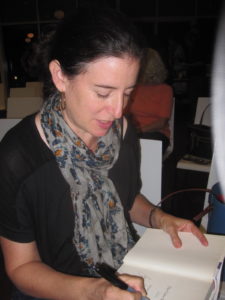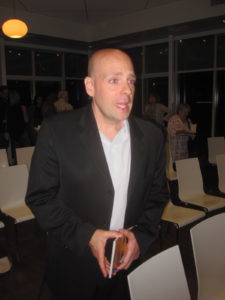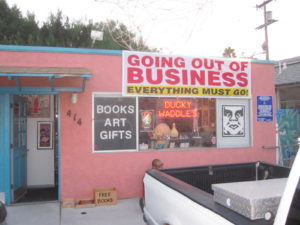
Last night we held the final poetry reading at the Ducky Waddles store in Leucadia, California. I wrote this piece as a memorial.
Memories of the Duck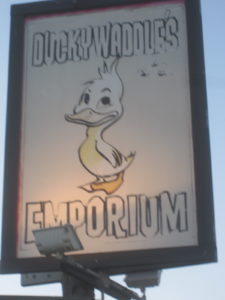
Jon Wesick
Ducky Waddles and I go way back. My chapbooks found a home on its poetry shelves and Jerry Waddle hosted several of my book releases but few people know I lost my virginity there. It was 1971 and she was the wife of an Apollo astronaut, not one of the moon landers but a mission specialist on a bullshit, Earth-orbiting flight NASA staged to use up leftover hardware. Anyway, Chloe was in debt to a biker gang called the Hoosier Hooligans for all the coke she’d put up her nose. One Saturday, I rode my ten-speed to the 7-Eleven for a Slurpee and found her surrounded by these thugs. Normally, I wouldn’t take on a half-dozen bikers but having just earned my yellow belt in karate, I was feeling confident. My chest block, reverse punch combination did the trick but Chloe and I had to get out of town because the Hooligans took a dim view of any sixteen-year-old laying out their members.
Chloe and I drove her Ford Pinto wagon as far as we could, abandoned it in Albuquerque, and took a Trailways bus to Leucadia, California. After she scored her nose candy, we had just enough cash left over to buy two tickets to the Jefferson Airplane concert at Ducky Waddles Emporium.
It was an intimate affair with nude women, body painting, and Paul Kantner handing out tabs of orange sunshine. After an hour things got weird and all I remembered were Grace Slick’s voice and hundreds of pendulous, blue breasts wherever I turned. When I woke up the next morning, dawn’s rosy fingers were caressing with walls of Ducky Waddles’ storage room and Chloe was straddling my morning wood.
“Hope you don’t mind,” she said. “I just couldn’t help myself.”
Imagine that! I was unconscious for most of my first sexual experience. Jerry was cool. He offered to let us crash in back if we worked at the store. Those were the best weeks of my life, opening the latest books by Burroughs and Ginsberg in the days and making sweet love to Chloe at night, but they did not last. One Thursday afternoon, a rumble of motors shook the Betty Page action figures off the shelves as a dozen Hoosier Hooligans pulled their Harleys into the parking lot. I guess Chloe shouldn’t have paid for the bus tickets with her credit card.
It looked like I’d be eating Thanksgiving dinner through a straw between my broken jaws until Jerry emerged from the back room with the AK-47, he’d taken off a KGB colonel when working black ops in East Berlin. There were a dozen quick cracks. A dozen bikers lay dead, each shot cleanly through the left eye.
A minor offense like mass murder counts for little when compared to the loyalty former CIA operatives feel for one another. The chief of police made the bodies disappear and strongly suggested that Jerry get rid of the murder weapon. Jerry couldn’t bring himself to part with his trophy so he melted it down and sculpted it into the wireframe duck that now sits on the store’s roof.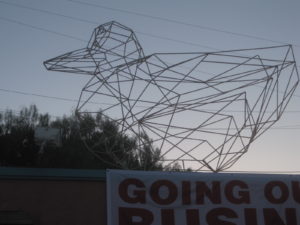
With all the commotion, Chloe and I had to leave. She checked into the Betty Ford Center while I returned to Ben Davis High School to finish my junior year. No matter where I went in subsequent decades, whether working as a roustabout in a Louisiana oil field or intercepting telemetry from Soviet missile tests in northern Greenland, I always longed to return to that little slice of paradise, Ducky Waddles Emporium in Leucadia, California. Fortune smiled on me and I did return in 1994.
It’s been a great couple of decades but nothing lasts forever. Now that the crappy economy has baked the Duck at 350 degrees and drenched it in an orange sauce of rising costs, falling literacy, and the high-fructose corn syrup of online competition, we must say goodbye to the Bukowski on the bookshelves and erotica by the counter. Goodbye to the Mary Fleener and Shepard Fairey paintings on the walls. And most of all, goodbye to thin, balding Jerry Waddle by the cash register. It’s been great!
